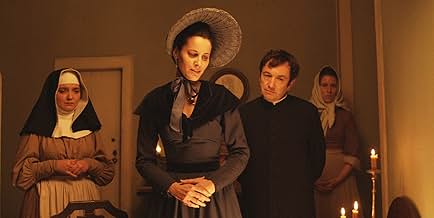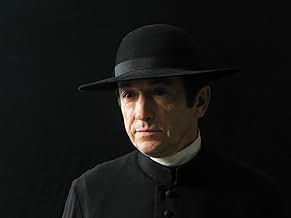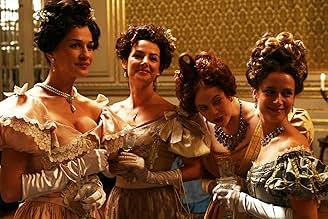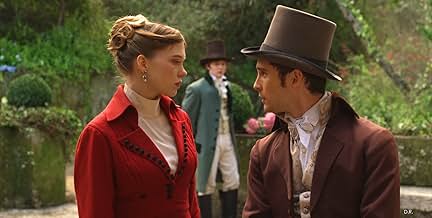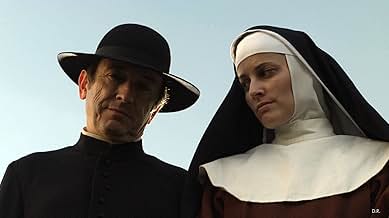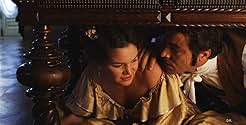IMDb RATING
7.4/10
3.7K
YOUR RATING
Follows a jealous countess, a wealthy businessman, and a young orphaned boy across Portugal, France, Italy and Brazil where they connect with a variety of mysterious individuals.Follows a jealous countess, a wealthy businessman, and a young orphaned boy across Portugal, France, Italy and Brazil where they connect with a variety of mysterious individuals.Follows a jealous countess, a wealthy businessman, and a young orphaned boy across Portugal, France, Italy and Brazil where they connect with a variety of mysterious individuals.
Browse episodes
7.43.6K
1
2
3
4
5
6
7
8
9
10
Featured reviews
Conversations reveal complicated pasts in this epic Portuguese novel brought to life
The Mysteries of Lisbon are not so much mysteries as they are a series of conversations which always lead to some sort of revelation. These revelations are melodramatic punch lines with interlocking characters continuously finding out who their parents are, where they came from, the results of lost loves, and everything in between. If the script was written in a linear fashion with no time jumps or flashbacks, there would be no mysteries; it would just be a meandering retelling of Romeo and Juliet (and all of their cousins).
The word meandering sounds harsh and an indictment of a script which does not know where it is going. However, I mean meandering as in there are multiple lead characters to follow and each of them has a very complicated past which takes its time to tell. The Mysteries of Lisbon is four and a half hours long; the director threw out accepted norms for audience patience in favor of showing the whole story. It is based on an 1854 novel by the Portuguese author Camilo Castelo Branco and it appears it was filmed in an unabridged fashion.
The main character is a village priest, Padre Denis (Adriano Luz), who at first is indirectly involved in a couple's forbidden love affair and then purposefully injects himself into their lives and then into everyone else's life who comes into contact with their troubles. Even though the priest is the interconnecting cog in the middle of all of these characters, he is not the narrator. That role is given to an orphan the priest looks after and becomes a driving force of his own later on.
The director, Raul Ruiz, obviously loves conversations, but only deep and emotionally scarring ones. Every conversation or recounting of a previous conversation has its own 30 minute segment it seems. The characters, usually just two, sit in a room and then the scene fades into flashback on what happened in the past which will now illuminate the present. I believe the time shifts were included to create the mystery. The author deliberately created the tension of not knowing and the 'a-ha' discovery moments because he could not have accomplished the same moments with a realistic, linear timeline.
The action is mostly set in Portugal and appears to be in the early 1800s but after Napoleon. The Emperor is frequently referenced but only in the past tense. Many of the characters are nobles so the costume designer had a true feast in outfitting so many people in remarkable period dress. The Portuguese scenery and elaborate set designs are also enjoyable; somebody really took their time to make the set look intensely real. The lighting is also employed to convey a sense of realness. There seems to be no artificial lighting whatsoever. Light only comes through windows during the day and the rooms are terrifically dark at night. The candles never flicker so there must be some source of artificiality, but it is not noticeable. Unfortunately, Raul Ruiz recently passed away on 19 August. He was Chilean born but left Chile in 1973 when Augusto Pinochet took power. The Mysteries of Lisbon is his final film and is of such epic proportions it appears he was thinking about this film for a long time before he finally took the plunge.
I recommend this film, but be careful. Watch it only if you appreciate long, intense scenes of dialogue or appreciate the intricate details of period films. There is extremely little action and drawn out sequences with no words spoken at all; however, there is character with the endearing name 'Knife Eater'. If these aspects do not scare you, then sit back and enjoy because you are in for a real treat. You will not see a film like this from an American director; no studio would ever sign off on a movie this long, not if they expect it to make any money.
The word meandering sounds harsh and an indictment of a script which does not know where it is going. However, I mean meandering as in there are multiple lead characters to follow and each of them has a very complicated past which takes its time to tell. The Mysteries of Lisbon is four and a half hours long; the director threw out accepted norms for audience patience in favor of showing the whole story. It is based on an 1854 novel by the Portuguese author Camilo Castelo Branco and it appears it was filmed in an unabridged fashion.
The main character is a village priest, Padre Denis (Adriano Luz), who at first is indirectly involved in a couple's forbidden love affair and then purposefully injects himself into their lives and then into everyone else's life who comes into contact with their troubles. Even though the priest is the interconnecting cog in the middle of all of these characters, he is not the narrator. That role is given to an orphan the priest looks after and becomes a driving force of his own later on.
The director, Raul Ruiz, obviously loves conversations, but only deep and emotionally scarring ones. Every conversation or recounting of a previous conversation has its own 30 minute segment it seems. The characters, usually just two, sit in a room and then the scene fades into flashback on what happened in the past which will now illuminate the present. I believe the time shifts were included to create the mystery. The author deliberately created the tension of not knowing and the 'a-ha' discovery moments because he could not have accomplished the same moments with a realistic, linear timeline.
The action is mostly set in Portugal and appears to be in the early 1800s but after Napoleon. The Emperor is frequently referenced but only in the past tense. Many of the characters are nobles so the costume designer had a true feast in outfitting so many people in remarkable period dress. The Portuguese scenery and elaborate set designs are also enjoyable; somebody really took their time to make the set look intensely real. The lighting is also employed to convey a sense of realness. There seems to be no artificial lighting whatsoever. Light only comes through windows during the day and the rooms are terrifically dark at night. The candles never flicker so there must be some source of artificiality, but it is not noticeable. Unfortunately, Raul Ruiz recently passed away on 19 August. He was Chilean born but left Chile in 1973 when Augusto Pinochet took power. The Mysteries of Lisbon is his final film and is of such epic proportions it appears he was thinking about this film for a long time before he finally took the plunge.
I recommend this film, but be careful. Watch it only if you appreciate long, intense scenes of dialogue or appreciate the intricate details of period films. There is extremely little action and drawn out sequences with no words spoken at all; however, there is character with the endearing name 'Knife Eater'. If these aspects do not scare you, then sit back and enjoy because you are in for a real treat. You will not see a film like this from an American director; no studio would ever sign off on a movie this long, not if they expect it to make any money.
10RMHolt77
A labyrinth of love and desire
MYSTERIES OF LISBON is a staggeringly immense epic, weaving together multiple narratives of operatic passion and desire into a broader memory-narrative patchwork. The late Raul Ruiz draws upon great predecessors to set the visual tone (there's plenty of Visconti's THE LEOPARD and Kubrick's BARRY LYNDON here), but then toys with the aesthetic by adding playfully surreal touches, so that the events seem perched on the edge of a dream. By design, it's all a bit messy, one narrative tumbling into the other, but Ruiz displays such complete mastery of the medium that MYSTERIES OF LISBON remains gripping, even over the course of its four-hour running time.
The word "masterpiece" is fairly overused, and as a result, devalued, but MYSTERIES OF LISBON is the real thing.
The word "masterpiece" is fairly overused, and as a result, devalued, but MYSTERIES OF LISBON is the real thing.
sweeping and epic -- it is more of a MASTERING of Lisbon
At four and one-half hours, this is the longest movie I have seen in quite some time. The length will most definitely detract many (as would the costumes and subtitles) from ever sitting down to view this; but I think those with patience and appreciation of "epic"/sweeping storytelling might like this one.
This is the story of Joao, a young orphaned boy (he discovers he's actually a bastard as the story unfolds) living in a Catholic orphanage under the watchful, caring eye of Father Denis. Joao learns of his parentage and where they came from and their circumstances ... and as those stories unfold we learn of different characters in THOSE stories as well.
The film spirals and sweeps and sways with several tangents and characters; but I found it all interesting and actually wanted to continue watching. That each of the stories intertwine and circle each other is part of the "mystery" of the title and parts of the film act and feel as if the entire production is a dream.
It is lovely to look at (gorgeous costumes and sets) and each of the characters has a revelation that continues the "mystery" and the intrigue and drama. The story travels from the streets of Lisbon to Venice to France to Tunis and to Brazil ... it is SWEEPING on a grand-scale as it also spans three decades.
Based on the late author, Camilo Castelo Branco's (who shot himself at the age of 70 b/c he was going blind) novel of the same name, Chilean director Raoul Ruiz has given us his final film (it is masterful) as he died shortly before the film began screening. That it is all so tragic and doomed and romantic is fitting ... as that is exactly what the movie gives its viewer.
I know none of my friends will give this one a shot ... it does require patience. But it is a beauty.
This is the story of Joao, a young orphaned boy (he discovers he's actually a bastard as the story unfolds) living in a Catholic orphanage under the watchful, caring eye of Father Denis. Joao learns of his parentage and where they came from and their circumstances ... and as those stories unfold we learn of different characters in THOSE stories as well.
The film spirals and sweeps and sways with several tangents and characters; but I found it all interesting and actually wanted to continue watching. That each of the stories intertwine and circle each other is part of the "mystery" of the title and parts of the film act and feel as if the entire production is a dream.
It is lovely to look at (gorgeous costumes and sets) and each of the characters has a revelation that continues the "mystery" and the intrigue and drama. The story travels from the streets of Lisbon to Venice to France to Tunis and to Brazil ... it is SWEEPING on a grand-scale as it also spans three decades.
Based on the late author, Camilo Castelo Branco's (who shot himself at the age of 70 b/c he was going blind) novel of the same name, Chilean director Raoul Ruiz has given us his final film (it is masterful) as he died shortly before the film began screening. That it is all so tragic and doomed and romantic is fitting ... as that is exactly what the movie gives its viewer.
I know none of my friends will give this one a shot ... it does require patience. But it is a beauty.
Utterly mesmerising
Mysteries of Lisbon in my view is utterly mesmerising, and one of those rare cases where there is no bad thing about it. As an adaptation of the novel, it succeeds wonderfully, on its own terms it is even more impressive. Mysteries of Lisbon may be lengthy at just over four and a half hours. But because everything was so well done, there was not a single moment where I was not transfixed.
On a visual standpoint, Mysteries of Lisbon looks amazing. The photography is gorgeous complete with beautiful-looking scenery and costumes, while there is an atmospheric and striking colour palette. The music does a fine job in conveying the mood of each scene, with not one scene feeling musically out of place.
Mysteries of Lisbon also benefits from a brilliant story. There are several story lines developed (very well) and incorporated throughout, but the main crux of the story told here is so unique and compelling it drew me in immediately. The script is of exceptional quality, often very moving, literate and thoughtful, while the characters have a complexity while being intriguing as well.
When it comes to the acting, there is not a single bad performance, Luz especially in the lead is fantastic. And throughout the direction is superb. Overall, this is mesmerising and highly recommended. 10/10 Bethany Cox
On a visual standpoint, Mysteries of Lisbon looks amazing. The photography is gorgeous complete with beautiful-looking scenery and costumes, while there is an atmospheric and striking colour palette. The music does a fine job in conveying the mood of each scene, with not one scene feeling musically out of place.
Mysteries of Lisbon also benefits from a brilliant story. There are several story lines developed (very well) and incorporated throughout, but the main crux of the story told here is so unique and compelling it drew me in immediately. The script is of exceptional quality, often very moving, literate and thoughtful, while the characters have a complexity while being intriguing as well.
When it comes to the acting, there is not a single bad performance, Luz especially in the lead is fantastic. And throughout the direction is superb. Overall, this is mesmerising and highly recommended. 10/10 Bethany Cox
Romantic, tasteful
This series of short stories set in a world long gone is of course a costume drama, that may therefore deter some. They would be mistaken. It is slow, considered, colorful and in my view a good introduction to the world of our ancestors, who held opinions different from ours, did things in a different way, and got upset about the same issues, yet in a different clothing. Love that is thwarted, wise padres, noble families with poor youngest children and all of that in a heavily draped world - sometimes a bit much. And yet I may recommend that you sit down, do not hurry, leave your perhaps preconceived ideas at the entrance, and enjoy these so many hours of romantic stories.
Did you know
- GoofsThe movie is set during the late 1700's to early 1800's. During the ballroom scene, several shots make it obvious that the gowns worn by the women have zippers in the back but the zipper wasn't invented until 1851.
- Alternate versionsAlso exists as a shorter (by about an hour), theatrically released, feature film version, Mysteries of Lisbon (2010).
- ConnectionsEdited from Mysteries of Lisbon (2010)
- How many seasons does Mysteries of Lisbon have?Powered by Alexa
Details
- Release date
- Countries of origin
- Official sites
- Languages
- Also known as
- Лісабонські таємниці
- Filming locations
- Production companies
- See more company credits at IMDbPro
Contribute to this page
Suggest an edit or add missing content



